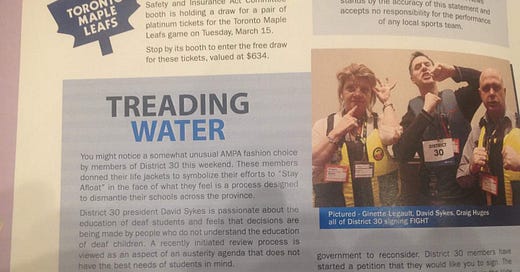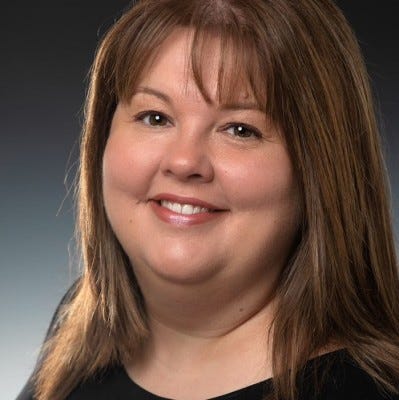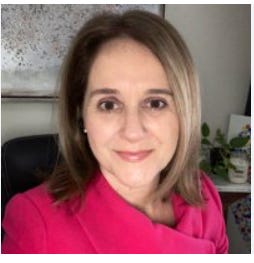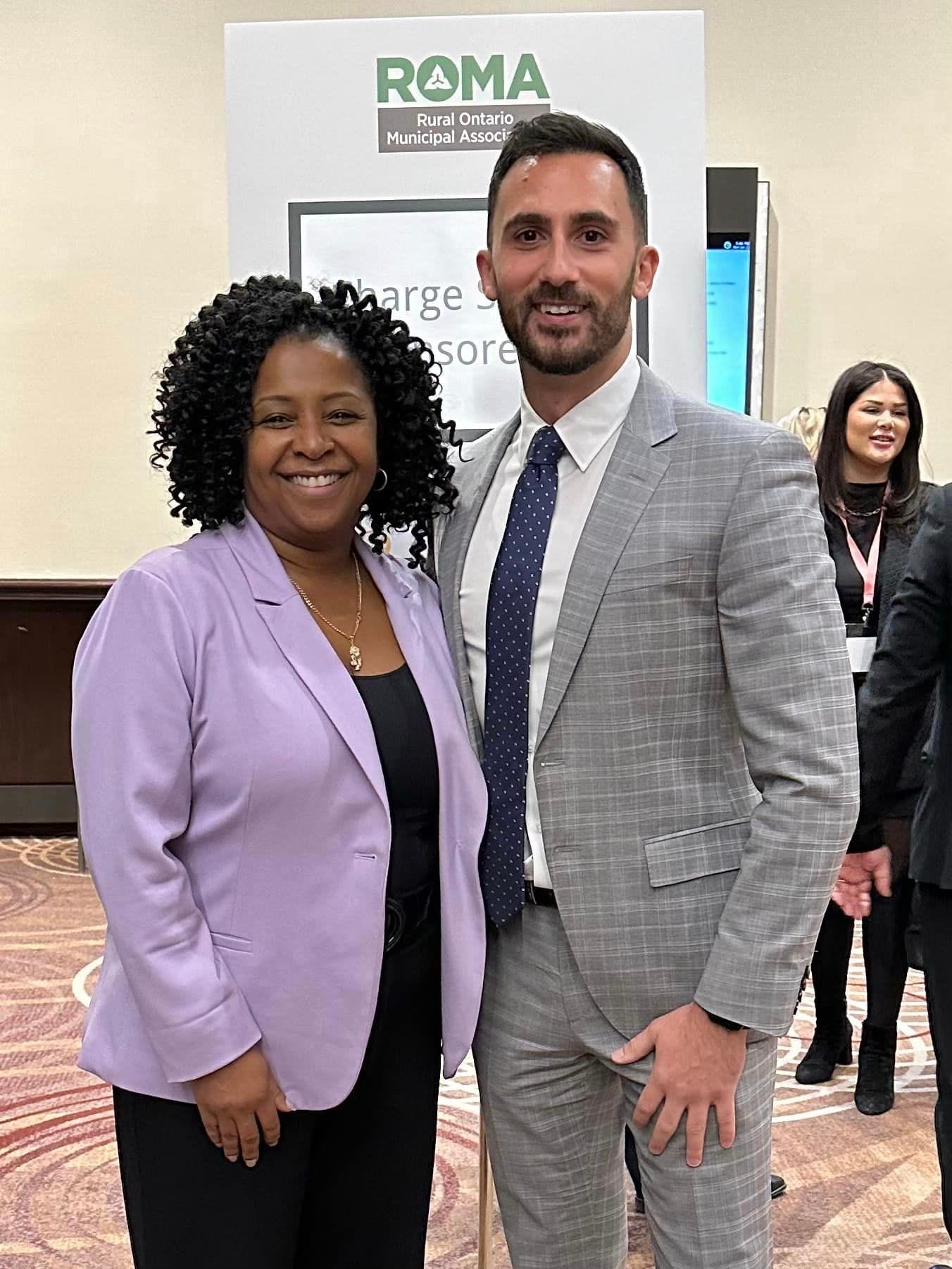Photo: Former executive director of PDSB Karyn Bruneel Photo Credit: Karyn Bruneel LinkedIn
Today on Small Change, I sit down with David Sykes, executive coordinator, district officer and chief negotiator for District 30 of the Provincial Schools Authority (PSA) and the union representative for approximately 200 teachers who work for the Provincial and Demonstration Schools Board (PDSB).
The PSA oversees seven English language schools for students who are blind or have low vision or are deafblind; deaf or hard of hearing; as well as demonstration schools for students who have severe learning disabilities. There is also a French language school in Ottawa that left the PDSB umbrella in 2019 and operates independently.
Provincial and Demonstration Schools, with the exception of Centre Jules–Léger in Ottawa, are unique because they do not have elected trustees for parents to contact with concerns and complaints. Instead, it’s unclear who parents should go to although it has been suggested that ultimately the buck stops with Education Minister Stephen Lecce and his deputy minister, Kate Manson-Smith who is not an elected Member of Provincial Parliament (MPP) but holds a senior administrative role within the government.
However, it’s no small feat to get Lecce to show up for much more than a ‘fireside chat’ and photo op and Manson-Smith has refused to meet with Provincial Schools Authority Teachers (PSAT) despite multiple requests.
PSA occasional teachers often have additional qualifications like American Sign Language (ASL) and deal with demanding and difficult classroom situations. Yet, PSA supply teachers are not members of any teachers’ union and do not have collective bargaining rights.
Instead, PDSB occasional teachers are paid by Ontario Public Service (OPS) $150 per day while unionized supply teachers in the Public and Catholic systems covered by collective bargaining are paid $240 per day. Needless to say there has been an exodus of supply teachers — along with full-time teachers — from the PDSB.
Preschool evaluations were cut during the COVID pandemic from in-person 90-minute sessions to 40-minute online sessions every other week. The number of preschool evaluation teachers was slashed from 34 to nine. And, oh, yeah, three of the teachers picked by the school authority were already on leave so it was really only six teachers. Needless to say, there’s a back log of children needing these essential assessments with over 100 children on the wait list.
That all falls squarely on the shoulders of Karyn Bruneel, executive director at the time, as does the fact that when these unassessed children enter the PDSB system they have been purposefully disadvantaged before their school career even begins.
Bruneel also prevented chief psychologist, Dr. Stephen James, from carrying out the clinical duties that he was hired to perform. That meant PDSB students had years of instruction, and even graduated, without needed assessments.
Dr. James, who is ASL proficient, resigned in February 2022. To really understand the extent to which these children, youth and their advocates like Dr. James, are being neglected and mistreated, it’s imperative to read Dr. James’ open letter which begins with,
“After 14 years of serving the OPS, decisions made by the senior management team (SMT) under Karyn Bruneel are the reason I am leaving. I love PDSB and its community. Leaving was a painful choice.”
By his account, Dr. James states Bruneel met with him a total of 37 minutes choosing instead to manage him via email and refusing to hold meetings by phone.
Dr. James concludes his open letter with this statement:
“Therefore, Karyn’s [Bruneel] choice to allow students to go without psychoeducational assessments for years, while she had an ASL-fluent, full time psychologist in the building willing to do them, will always be a mystery to me. The decision does not seem to make clinical, financial, political, or ethical/equitable sense.”
Bruneel, who worked from her home in Goderich, left the executive director position in June 2022, but not before having her son hired as a teacher of the deaf despite lacking qualifications and without being a certified teacher.
In February 2024, Lecce announced at Queen’s Park that a new clinical director had been hired. What Lecce failed to announce was that Dr. Stephen James had been hired on contract to fill that vacant position.
Incidents have been documented at E. C. Drury School, a residential school, where day students have been left out in temperatures just above -20 Celsius leaving those students prone to frost bite on their extremities as they remove their mittens and gloves in order to communicate with peers.
Students arriving by bus are also routinely left out in the rain until the doors to the school open at 8:30 am.
On January 15, 2024, Sykes sent executive director of PDSB Schools, Stephany Balogh, an email regarding a December 5, 2023 incident when he noticed a large gathering of students standing in the cold and rain out front of E. C. Drury. Sykes pointed out that students dropped off by bus were required to wait outside until 8:30 am.
He shared this information with the Employer Relations Advisor and also raised the issue during grievance meetings with superintendents with an ask that it be shared with Balogh for action.
Sykes requested student either be let in as soon as their busses drop them off or alternatively, that busses not drop students before 8:30 am.
That same day Balogh responded via email:
“Thank you for the email. The matter involving the immediate entry of students when it pertains to inclement weather and temperature thresholds has been addressed. We are committed to taking every reasonable precaution and will continue to monitor.”
The following day Sykes sent a photo of students — it was unidentifiable individuals to protect student privacy and the photo was not archived — once again standing outside in inclement weather to Balogh asking what criteria was being used to determine inclement weather.
Balogh’s response on January 17, 2024 stated in part, “Regarding the cold weather temperatures, the Regional Health Departments issue cold weather alerts/warnings which provide guidance on cold weather warnings for outdoor activities. Both cold weather and transportation protocols are being reviewed across PDSB.”
So, instead of the issue being ‘dealt with’ as stated by Balogh, Regional Health Department protocols were being used as the protocol determinant. However, those protocols failed to recognize the uniqueness of the situation because these are students who use their hands to communicate and in extreme weather could experience frost bit.
Also, on at least one occasion a student urinated out front of E. C. Drury because they could not get inside after traveling on a bus for quite a long time.
Photo: Stephany Balogh, current executive director PDSP Credit: X.com
According to Sykes, “This is another systemic gap that is discriminatory in nature. I confess I’m disappointed in a response that does not recognize the needs of these students.”
Once inside PDSP buildings, students routinely experience class sizes that violate the collective agreement for class safety while the dearth of teachers means entire classes of kids and youth are often sent to work in the library.
The buildings — one from the 1870s and the remainder from the 1960s — have reached dangerous levels of disrepair. One school without an emergency response system was told to use a cow bell. Swimming pools needed to teach students water safety have been closed for years. The auto shop ceiling at E. C. Drury school in Milton is structurally unsound. Many of these issues have been reported by the Ford government’s own Ministry of Labour inspectors.
The Ford government just settled two class action suits with students dating as far back as the 1970s paying out $23 million. There’s also another three filed or pending law suits.
And, make no mistake there will be more lawsuits particularly after a Newfoundland human rights commission established that preventing language development was a human rights violation.
Brodie Gallant was the Human Rights Board of Inquiry adjudicator that oversaw the Carter Churchill vs the Newfoundland and Labrador English School District inquiry for the Newfoundland Human Rights Commission. Gallant found that the school district deprived Carter Churchill of language development and that violated his rights.
The Board of Inquiry released its 116 page decision on March 1, 2023. Included in Gallant’s statements was the following:
"[362] I am particularly concerned by the Districts’ failure to adequately support Carter in the area of language development generally, and in particular its failure to respond to the concerns raised by its roster of ITDHH. These teachers were sounding the alarm with respect to the programming being offered to students with severe language delays such as Carter. At times they explicitly framed this as a Human Rights issue. They made specific proposals for changes to the programming offered to these students. Their proposals were dismissed summarily without being properly explored or evaluated by the District. This meant years of delay in proving intensive supports to address the language delays experienced by this cohort. The expert evidence presented emphasized the critical importance of early intervention in language acquisition – the impact on these students and Carter in particular may be long lasting or permanent. Years of opportunity have been lost. Carter will be entering junior high and high school in the near future. It is unlikely that there remains time to fully address his language delay and he will continue to experience disadvantage flowing directly from these years of missed opportunity. With each year he fell further and further behind. It appears there is a strong probability that negative consequences will persist into his adult years."
The issue remains, that not one of those Board of Education or Ministry of Education decision makers was held accountable for there actions. Not in Newfoundland and not in Ontario.
In fact, Joel Wittnebel’s February 29, 2024 article for The Pointer, ‘A Slap in the Face: PCs dismiss documented cases of sexual abuse, discrimination against deaf, blind students as “opposition rhetoric,” quotes Ajax MPP Patrice Barnes as calling the allegations exactly that, “opposition rhetoric.”
Right to Left: Education Minister Stephen Lecce and his Parliamentary Assistant Patrice Barnes, MPP for Ajax, who called Pasma’s concerns ‘opposition rhetoric’ and stated with a straight face in Queen’s Park that the province is providing good opportunities for deaf, hard of hearing, blind and those students with severe learning challenges. Photo Credit: Stephen Lecce Facebook
I encourage you to make the time to hear what it’s like to be an educator working for a Ministry of Education that has no comprehension of, nor compassion for, the students, teachers or culture at PDSB schools. And, as Bruneel, Balogh, Barnes, Lecce and the rest of his rogue team have shown, there is not even an inkling of desire to develop a rapport let alone to tackle the life altering issues faced daily by students, parents and staff.
Instead, the Lecce team is actively undermining the classroom success of deaf, blind and challenged children and youth robbing them of successes in the present as well as hope for their future.
Unfortunately, that means many PDSB graduates will end up living on Ontario Disability Support Program (ODSP) payments of $1,300 per month. Sykes and I discussed the prospect of four students moving in together after graduation and living on ODSP.
However, it’s important to mention that when someone receiving ODSP moves in with roommates they must disclose that to their social worker who then adjusts their housing allotment.
ODSP allocates 30% of the monthly payment for rent. That’s $390 per month. When someone has three roommates that amount is adjusted down to $97.50 because each roommate is expected to be contributing an equal share — one-quarter of the rent.
At the very least the Ford government needs to base the housing allotment on realistic market rental rates and stop clawing back funds when people share accommodations.
Instead, money saved by living with roommates could be put towards better food and general living expenses improving overall social determinants of health. A much better answer would be instituting a livable universal Basic Income — or, as I call it, a universal standard of living.
Hopefully, this gives a clearer picture of what adult life will be like for youth graduating from deaf, blind and demonstration schools when they have been denied the education, skills and training they not only deserve, but have a human right to, and end up living in poverty on ODSP.
Find additional background information and hear my interview with NDP MPP and Education Critic, Chandra Pasma regarding the PDSB here.
Music: Real Estate by UNIVERSFIELD is licensed under a Attribution 4.0 International License. freemusicarchive.org.
*Be sure to download the Substack app to get the most from your podcast experience.















Share this post